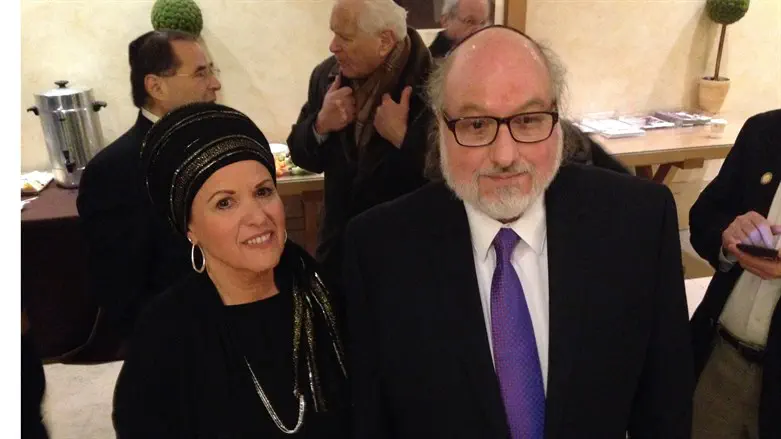
Parashat Terumah opens with G-d instructing Moshe to tell the Children of Israel to begin collecting the materials to build the Mishkan and its accoutrements. The rest of the Book of Exodus (except for the sorry incident of the golden calf) recounts the construction of the Mishkan.
The opening verses of our Parashah (Exodus 25:3-7) list the fifteen items that were to be donated for the Mishkan:
Gold;
Silver;
Copper;
Techelet (sky-blue dye);
Argaman (royal-purple dye);
Scarlet-dyed wool;
Linen;
Goat-hair;
Red-dyed ram-skins;
Tachash-skins (there are different opinions what the “tachash” was);
Acacia wood;
Oil for illumination;
Aromatic spices for the oil of anointing and for the incense;
Shoham stones (some kind of precious stones, there are different opinions of their identity);
Stones for setting in the Ephod and the Breastplate.
Rabbi Menachem Recanati (Italy, late 13th century) comments on this: “The Torah mentions fifteen things, corresponding to which are fifteen Psalms of Ascents [Psalms 120-134], fifteen words in the Priestly Blessing , and fifteen expressions of praise in Yishtabach [שִׁיר וּשְׁבָחָה, הַלֵּל וְזִמְרָה, עֹז וּמֶמְשָׁלָה, נֶצַח, גְּדֻלָּה וּגְבוּרָה, תְּהִלָּה וְתִפְאֶרֶת, קְדֻשָּׁה וּמַלְכוּת, בְּרָכוֹת וְהוֹדָאוֹת]. These correspond to the Divine Name Yud-Heh [whose gematria is 15]” (Commentary on Exodus 25:3).
As the twelfth month of the year, Adar I begins, it might be appropriate to examine the twelfth of these ingredients: שֶׁמֶן לַמָּאֹר, oil for illumination.
Now there is a peculiarity in the spelling: the oil for illumination appears here in the Torah as שֶׁמֶן לַמָּאֹר, instead of שֶׁמֶן לַמָּאוֹר; that is to say, the Torah omits the letter vav in the word מָאוֹר, which is the more usual and expected form (vide Genesis 1:16, Exodus 27:20, 35:8, 35:14, Leviticus 24:2, et al.). This is the sole occurrence in the entire Tanach that the word מָאֹר appears in this form, without the vav, instead of מָאוֹר with the vav.
What is the significance of the missing vav?
I note that earlier this week, the Nation of Israel lost one of its precious daughters, Esther Pollard זצ"ל, who passed away in Jerusalem in the early morning hours of the final day of Sh’vat.
Maybe not coincidentally, the gematria of שֶׁמֶן לַמָּאֹר is 661, the same as אֶסְתֵּר, Esther. Maybe – just maybe – the Torah itself feels the loss of Esther, and therefore writes מָאֹר, lacking the vav, to allude to her, however obliquely.
The Hebrew word וָו, vav, means “hook”, and in the Tanach appears exclusively in the context of the hooks which were used in the Mishkan (13 times from Exodus 26:32-38:28). That is to say, the וָו denotes a connection, it is something which links and connects one item to another (which is, of course, why the letter ו as a prefix means “and”).
The Torah removed the וָו, denoting the connexion, from the word מָאוֹר, in this week which marks the passing from the world of an exceptional Jewish woman, leaving us with the defective מָאֹר.
The Targum Yonatan translates “oil for illumination” into Aramaic as מְשַׁח זֵיתָא לְאַנְהָרָא, “olive oil to illuminate”. And Rashi comments that the שֶׁמֶן לַמָּאֹר, the oil for illumination, is “pure olive oil to kindle the Eternal Lamp”; the “Eternal Lamp” is the נֵר תָּמִיד, the lamp that was to burn continuously, which appears for the first time in the first verse of next week’s parashah (Exodus 27:20).
King Solomon famously said that “Hashem’s candle is the soul of a person” (Proverbs 20:27). The נְשָׁמָה, the soul, is immortal: like the נֵר תָּמִיד, the soul remains eternally. The human consists of body and soul, and when the physical body dies, “the dust returns to the ground as it was, and the spirit returns to the G-d Who gave it” (ibid. 12:7).
Following the Recanati’s commentary (cited above), that the fifteen expressions of praise in Yishtabach correspond to the fifteen items which G-d commanded the Jews to donate for the Mishkan, the inference is that the twelfth item, oil for illumination, corresponds to קְדֻשָּׁה, holiness.
Esther Pollard’s physical body returned to the ground of the Land of Israel, her spirit has returned to the G-d Who gave it. We in this world – and above all her husband Jonathan – have lost the vav, the connection, as this brave and wonderful woman left this world.
Her soul, her illumination, has ascended in קְדֻשָּׁה, holiness, to the highest.
Parashat Terumah opens with G-d’s command that “They take for me a donation” (Exodus 25:2).
What does the word תְּרוּמָה, terumah, which we have translated here as “donation”, really connote?
– The Targum Onkelos and Targum Yonatan both translate תְּרוּמָה into Aramaic as אַפְרְשׁוּתָא – “that which is to be separated”, which Rashi and Rashbam both take as the meaning of תְּרוּמָה.
Rabbi Shimshon Raphael Hirsch, in his German translation and commentary of the Torah, simply transliterated the word as “Teruma”, and explained it as coming from the root רום – “to be raised above something, hence ‘lifted up out of’, i.e., to be separated for some higher purpose”.
In this, he seems to follow the Zohar (Ra’aya Meheimna Volume 3 [Numbers], Parashat Korach 179a), which also relates the word תְּרוּמָה to the root רום, elevated.
In this Parashah, the word תְּרוּמָה, terumah, tells us that donating to G-d means being separated and elevated to a higher purpose.
The שֶׁמֶן לַמָּאֹר, oil for illumination, the pure olive oil which gives eternal light, the illumination which in this verse alone lacks the vav, the oil which represents the eternal soul and קְדֻשָּׁה, holiness, illuminates the ascent to eternity.
המקום ינחם את בעלה של אסתר ז"ל בתוך שאר אבלי ציון וירושלים